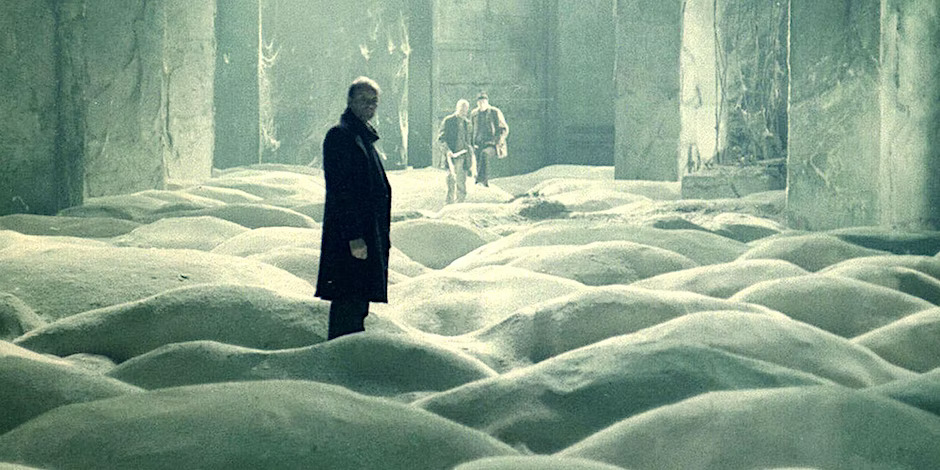
- This event has passed.
FTT Seminar: Mysticism and Spirituality in Film and Performance
Event Navigation

RUINS – An Archaeological Excavation
Silvia Battista
This presentation stems from the practice-research Spirits Read Foucault to explore questions around traces, ruins, and their value for future ‘ruminations’. It does not follow a linear structure, but it is organized around a list of 13 fragments, ruins of my own thinking. I encourage participants to treat them as an archaeologist would do with founded fragments: weave a fabric of their own by following intuitive impulses.
Spirits Read Foucault (2015-2019) consists in a video-performance-research-experiment that employs storytelling, guided visualization, and mental imaginary. The aim is experiential wherein performance is used as a vehicle to guide audiences to reflect on the meanings of our embodied lives, on the identity politics attached to our bodies and their appearances, and on what – if something – remains after the physical body is no longer physically present. The intention is to encourage attention toward the intertwined body-mind liminal complex, as an order of materiality that crosses beyond its discrete boundaries to meet the spiritual.
Spirits Read Foucault is permanently available on RUINS, the online festival curated by the artist, scholar [M]Dudek and BARS – the British Association of Religious Studies.
Instructions: Please sign up to the festival – it is a very easy process. Once signed up, you will be able to sign in any time you want – there are many interesting works to be explored.
When you enter the platform click on Spirits Read Foucault – on the top, right corner. Before playing the video, please click on READ FIRST: LETTER: SPIRITS READ FOUCAULT: ACT ONE. It is important that you do that as there are warnings regarding contents. Once read the letter and decided to proceed, play the video.
Silvia Battista is a multidisciplinary artist and academic. She is senior lecturer at Liverpool Hope University and the co-convenor of the international working group Performance, Religion and Spirituality of the IFTR – International Federation of Theatre Studies. Central to her practice-research is the study of spiritual practices and mythmaking processes in contemporary performance art. She sees herself as a weaver of metaphorical fabrics, mythopoeia, and speculative fiction. She has presented her work internationally from pubs and music venues to galleries, museums, and universities. Lately, she has performed at the Williamson Gallery (2022); Tate Liverpool (2019); Liverpool Biennial (2019); and the Stockport War Memorial Gallery (2018). She published the monograph Posthuman Spiritualities in Contemporary Performance: Politics Ecologies and Perceptions (Palgrave) and the edited book The Performances of Sacred Places: Crossing, Breathing and Resisting (Intellect).
Visionary, transpersonal and entheogenic experience in Tarkovsky’s Stalker
David Foster
Andrei Tarkovsky wrote that his film Stalker (1979) ‘is about the existence of God in man’. This paper examines that film, and particularly one of its key sequences, in the light of this idea, and asks what an approach to the film through this context might suggest about its engagement with visionary, transpersonal and entheogenic experience, and about the relationship of such experience to the uses and value of art. Via a brief consideration of the constitution of mankind in relation to the divine as mythologised in The Truman Show (Peter Weir, 1998), the paper draws on some of the work of C. G. Jung, Aldous Huxley, Rainer Maria Rilke, Friedrich Nietzsche, Mircea Eliade, and the Neoplatonist philosopher Plotinus, as well as the writings of Tarkovsky himself and the work of some noted Tarkovsky scholars. Ultimately I want to suggest that the experience of ‘The Room’ in Stalker would be the experience of ‘the Real’: the ineffable, the absolutely paradoxical, that which is beyond symbolisation but upon which manifestation is founded.
David Foster is a visual artist and a lecturer in film at the University of Reading. He makes artwork about his experience of and relationship with place, land, and the natural world. He works mainly with photography, especially double-exposure photography, but also with video, film, text, and found objects. In recent years, his practice has been funded by several grants from Arts Council England, and solo exhibitions of his work have been held in Oxford, Suffolk, Dorset and Sussex. David’s main interest as a film scholar is the ‘art cinema’ of such filmmakers as Andrei Tarkovsky, Ingmar Bergman, Jean-Luc Godard, Michael Haneke and others, but his previously published research has mostly related to some of Samuel Beckett’s work and has appeared in Screen, Studies in European Cinema, the Journal of Beckett Studies, the Moving Image Review and Art Journal, Samuel Beckett Today/Aujourd’hui, and in edited collections.
About this event
The FTT Research Seminar Series is hosted by the University of Reading and puts research from scholars in Film, Theatre and Television into dialogue. This celebrates the exciting intersection of these fields within our department and seeks to support collaboration and conversation across Film, Theatre, and Television.
Each invited paper is 25-30 minutes long and is followed by a participatory Q&A discussion. This seminar will be held online.
